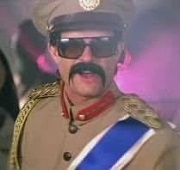|
Yeah I was asking about the Battle of France. Should have specified, but I completely forgot about the Battle of the Bulge when writing that post.PittTheElder posted:Oh yea if we're talking Battle of France, then the first thing to say is that the Maginot line didn't extend along the Belgian frontier in the first place for political reasons, so that's not a factor. The bolded part seems to be disputed. I'll try to better explain what I'm asking. This is the video I mentioned in my first post: https://www.youtube.com/watch?v=7gBn5BipK2U&t=320s. It doesn't cite its sources, but it also doesn't seem like its making up bullshit. At 5:20 in this video they start to explain the defenses along each part of the border, including Belgium. Then at 5:50, he says that the Germans didn't attack through the Ardennes sector of the line. But he doesn't say where they did attack. What I'm getting at is this: is it really true that the Germans found an undefended or lightly defended part of the border and bypassed the Maginot line? Or were other factors more important for their victory?
|
|
|
|

|
| # ? Jun 10, 2024 03:55 |
|
The WW2 channel is fine, though they're mostly telling the Anglo-American story of the war. I'm mostly salty because they do a terrible job of communicating the relative importance of the eastern front. E2:  nope if you look at the positioning of the Aisne and the Belgium border, that is literally exactly where the breakthrough happened. I don't know if the animation is wrong or Indy is just talking out of his rear end. nope if you look at the positioning of the Aisne and the Belgium border, that is literally exactly where the breakthrough happened. I don't know if the animation is wrong or Indy is just talking out of his rear end.E: Arguably the Maginot line did do it's job, in that it forced the Germans to attack in the North where all of the Allied force was concentrated. In a historically removed Paradox game sort of perspective I think the Allies had the force to stop the German attack based on the information they had. That they failed to do so is largely because their staff just got severely out generaled. That said the political imperative to drive the allied armies into Belgium as fast as possible in order to fight there (and thus wreck Belgium rather than France while fighting a replay of the Great War) did the allied generals no favors. PittTheElder fucked around with this message at 04:47 on Jul 13, 2022 |
|
|
|
VostokProgram posted:What I'm getting at is this: is it really true that the Germans found an undefended or lightly defended part of the border and bypassed the Maginot line? Or were other factors more important for their victory? The main factor left out from Battle of France narratives is the Franco-British command's own strategic decisions. The operational map that PittTheElder posted can illustrate the broad strokes. The common narrative about the Battle of France is that the French were hiding behind the Maginot line and neglecting the Belgian border, but as you can see on the map, there's actually quite a lot of armies in Belgium itself, including the BEF and the French 1st Army, consisting of best-equipped units in both countries. These armies did not start in Belgium, but rather on the French border. When the Germans invaded war on Belgium, the Franco-British force invaded (peacefully) from their own side. This was a plan developed by the French in the interwar, and part of an integrated defense scheme involving the Maginot Line. The point of it all was so that the French, who were weaker economically and demographically than the Germans, could concentrate their limited mechanized formations into a fight on Belgian soil while defending the Franco-German border with inferior formations. Meanwhile, the Germans were plotting an attack through the Ardennes, I believe because the French plans were fairly public. These two plans collided in a way that extremely disadvantaged the French and British for a variety of reasons. -The advance into Belgium entailed a long-distance march. You can see that it was basically the same distance crossed by the Germans. Obviously they were doing it without fighting, but these really quick, long-distance advances need alll sorts of logistical scheduling to be plotted out beforehand. When the Germans showed in numbers crossing the Meuse, the French had major difficulties reacting because they were in the middle of marching to Belgium. For example, the 1st French Armoured Division, which attempted to counterattack the Northern flank of the German offensive, showed up at Flavion out of fuel because one of its supply columns was late. It was destroyed in a really one-sided performance (most French-German armoured battles resulted in mutual destruction) -The French and British vacated their positions on the Franco-Belgian border. You occasionally hear stories of Rommel advancing 50 miles in a day or whatever. Well, that's less impressive if you consider that he was traipsing through almost undefended countryside and Franco-British supply dumps. There were attempted counterattacks, which had varying levels of success, but because the defenses were so sparse, the Germans could just turn and keep advancing in a different direction if they encountered major resistance. -The very best units of the French and British militaries were encircled and trapped in Belgium. A lot of personnel was evacuated, but there was nothing to arm them with so they were useless for the time being. This meant gave the Germans lots of options in the latter half of the Battle of France, they were safe from mechanized counterattacks and so could operate with impunity. This is why the French couldn't defend the rest of France, numbers-aside, they had no more modern equipment. The Germans had several qualitative advantages that gave them a serious advantage over the French, (air force, communications, mostly), but most of the reason for their victory in reality was strategic. If the French abandoned the Belgian plans and did nothing at all instead, the German breakthrough would certainly not have happened.
|
|
|
|
poo poo, had a counterattack at Sedan been launched promptly after the French command learned that the Germans were across the river, there's a fair chance even that might have halted the German advance even with the dash into Belgium. Most of my reading on the topic is from Wikipedia, but I can't read the article on the Battle of Sedan without coming away with the conclusions that a) it was an extremely close run thing even with all the French missteps b) the French could still have salvaged the whole thing if they weren't trying to refight WW1 (but you know, Gay Black Huntziger and all that) e: Actually, going back to this map: Obviously loads is made of Guderian's breakthrough at Sedan, but what's going on with Reinhardt's XLI Panzer Corps at Montherme? I can find basically nothing written about it in English on the web, even though that also looks like a disastrous breakout for the French. Was Reinhardt just a terrible self promoter compared to Guderian? PittTheElder fucked around with this message at 05:29 on Jul 13, 2022 |
|
|
|
Don't know if people were looking for more examples of Axis PTSD: My gramps was a German antitank gunner, spent a lot of time in the Eastern Front. I didn't really get a lot of stories from him until I was old enough to be a bit of a milhist nerd myself and by then he was pretty old. But what the entire family remembers is that he HATED rats. During the war he apparently was stationed for months in the winter guarding a front line. The Soviets made repeated failed attacks all winter. The ground was way too frozen to properly bury their own dead, let alone the Soviets littering the frontline. When the spring thaw came he claims there were rats beyond counting just swarming the area, devouring all the now unfrozen corpses. He'd wake up with rats crawling all over his body. He had a mental breakdown of some sort that was recognized even in the middle of the war and got sent to to the rear for an extended stay before they let him rejoin his unit. Grandpa ends up in a PoW camp in the US, and marries a local farm girl (oddly enough, grandma's family were all Russian immigrants). I think he was contracted out by the camp to work on some local farms and got friendly with the locals and decided to stay when he got set loose, as his family home was destroyed in the war and also in the East. He despised rats so much and was completely terrified of them, and would make elaborate traps and train dogs to kill them and gather posses of neighbors to hunt the rats on the property. My cousin got a pet rat and my grandfather refused to even be in the house with it, they'd have to bring the cage out in the backyard when he visited and he threatened to destroy it the moment he saw it. He was a pretty kindly old man but all of his rage and terror from the war seemed to crystallize onto the rats. It was sometimes treated as kind of a family joke but the look on his face when he talked about rats was hosed up, he'd shake and gnash his teeth, I guess he may have been getting flashbacks. Oddly enough his most serious injury of the war came from when he got kicked in the chest by a horse after it got spooked during an artillery strike, but he loved horses and even had his own for awhile. The rats were his enemy for life. When he got a lot older and more senile he'd complain of seeing them even when they weren't there.
|
|
|
|
PittTheElder posted:poo poo, had a counterattack at Sedan been launched promptly after the French command learned that the Germans were across the river, there's a fair chance even that might have halted the German advance even with the dash into Belgium. Most of my reading on the topic is from Wikipedia, but I can't read the article on the Battle of Sedan without coming away with the conclusions that a) it was an extremely close run thing even with all the French missteps b) the French could still have salvaged the whole thing if they weren't trying to refight WW1 (but you know, Gay Black Huntziger and all that) The French spooled up attacks a lot but they took forever because the French readiness began the war at such a low ebb in the mobilized units. One of the huge problems was that the French preferred to launch coordinated attacks but the tanks used in the companies that provided support for the infantry were extremely thirsty and they never really made an effort to logistically manage these units. That was the real problem with the 'penny packets'- not the concept of having tanks for infantry support, but that they didn't come with the rear area units that kept tanks running. Plenty of French infantry units had to just sit and watch Meuse crossings because they just couldn't effectively respond. The units with a lot more agility got stuck and encircled in Belgium.
|
|
|
|
A low key point that map highlights: both flanks of the German spearhead are handily protected by rivers that they are advancing parallel to, which complicates any sort of operational response other than 'try to get in front'.
|
|
|
|
gently caress me running I just had a long reply eaten by my browser. I'll tl;dr it:Slim Jim Pickens posted:The main factor left out from Battle of France narratives is the Franco-British command's own strategic decisions. The operational map that PittTheElder posted can illustrate the broad strokes. I'll add a few things to this. The plan from the outset was to use the Maginot line to hold the southern flank while wheeling the bulk of the French (and British if they were in it) armies north, especially the more modern, mechanized forces. There are a couple of reasons for this, both political and geographical. But this: Alchenar posted:A low key point that map highlights: both flanks of the German spearhead are handily protected by rivers that they are advancing parallel to, which complicates any sort of operational response other than 'try to get in front'. Is a big part of it. Basically most of the rivers in France run east to west along the border with Germany and Belgium until you get a fair bit into France, where they then turn NW to the sea. If you don't want to fight in France (more on this later) you really don't have any good natural barriers. This was also a problem for France in 1870. You can see that here:  I mean there are some, but they're also pretty far into France. Meanwhile if you go NE Belgium has a lot more waterways that go SE -> NW, including a fair number of decent canals.  The plan was to rush forward to the Dyle and the Albert Canal and use those as natural defenses to blunt the initial German attack while building up greater defenses behind the lines (still in Belgium). The southern end of that line would be anchored by for Eben Emal, which was pretty impressive. Given what historically happened it's easy to dismiss that, but the Belgian forts held out for a pretty decent amount of time in WW1, gave the BEF time to get across the channel in force, and really, really blunted the German advance into NW France. The idea was much the same: blunt the German advance, force it into a WW1-like stalemate, and bleed them until they sure for peace. Only this time do it mostly in Belgium because: Politics. The devastation of WW1 was a huge deal in inter-war French politics and fighting another WW1-scale war on French soil was a non-starter. I mean, poo poo, even today there are chunks of the WW1 front that can't be used, and that's after almost 110 years. They really, really did not want to do that again, and fighting the next war someplace that wasn't france was a pretty deal. Then, as others have said, there are a host of other issues in the French military at the time. Logistics problems, issues with cooperation between generals, generally uninspired leadership, disagreements and problems between the military and civilian leadership, etc. The thing is that none of this was unique in inter-war armies and none of it needed to be fatal. If the French had instead concentrated their forces on the Meuse/Aisne/Somme line they would have had better internal communications, better natural barriers, and probably avoided the breakthrough and encirclement that doomed their defense. But, well, those names probably sound familiar to anyone in this thread and that was kind of the problem. Meanwhile the chunk of southern belgium and luxembourg between Eben Emal and the Maginot Line was pretty rugged with poor roads. The general assumption wasn't that the Germans couldn't go through there, but that they couldn't move mechanized forces through there and it could be bogged down in ugly infantry fighting. The sort of thing that's rough for both sides, but doesn't lead to a break through. And they knew the Germans knew this, so the assumption was that anything moving through there would be lighter forces that could be held with equally minimal forces. Only, they DID move mechanized forces through. It's important to note, though, that this was a huge undertaking and a loving catastrophic nightmare on the German side. Famously there was a road through the area that had something like a 200+ mile long traffic jam during the invasion and was the largest and longest traffic jam in history up until some catastrophically hosed thing happened in China a few years ago during one of the holidays where everyone leaves the cities for their family villages. Then, of course, there was both bad leadership and bad luck. That colossal traffic jam got spotted by French recon aircraft and dismissed by leadership as being impossible because you can't move tanks through that area. The counter-attack that was supposed to pinch off the break-out was hamstrung when one of the only generals in the northern pocket briefed on it died in a car wreck (which also gets to issues with leadership structure in general). The tl;dr though is that the Germans were honestly pretty good at maneuver warfare. Most of their big, early victories were due to being able to encircle big armies and eliminate them, both here (the dieppe pocket) and in their campaigns in the east. They also thought that rough terrain wasn't as impenetrable to mechanized forces as many others assumed and, in this case, were proven right.
|
|
|
|
Fish of hemp posted:I once came across this contemporary document about Vietnam veterans who isolated them selves into woods. Rough poo poo. Wow a cotard delusion on one of these guys
|
|
|
|
PittTheElder posted:poo poo, had a counterattack at Sedan been launched promptly after the French command learned that the Germans were across the river, there's a fair chance even that might have halted the German advance even with the dash into Belgium. Most of my reading on the topic is from Wikipedia, but I can't read the article on the Battle of Sedan without coming away with the conclusions that a) it was an extremely close run thing even with all the French missteps b) the French could still have salvaged the whole thing if they weren't trying to refight WW1 (but you know, Gay Black Huntziger and all that) France was very deliberately not trying to refight the Great War. The 1st Army/BEF spearhead into Belgium was a pre-emptive and nearly successful destruction of any repeat Schlieffen. The motorized DLMs met and bested Germany's armour (most decisively at Hannut there on 12 May), only pulling back because the traffic jam made it through the Ardennes and crashed into some lovely reserve divisions. Sedan was the battle of the middle-aged dad reservists vs Germany's best.
|
|
|
|
Oh yeah I didn't mean to imply the war plan overall was that, just the actions around Stonne and Sedan. It really feels like they're trying for this super coordinated attack to be ready and refusing to do anything until it was, because that's the poo poo you needed to do to succeed in 1917 (even though that's clearly not the situation they're facing at Sedan). Certainly the wider plan was to avoid refighting the last war at all costs.Mr. Grapes! posted:Don't know if people were looking for more examples of Axis PTSD: I'm betting I'm 50 years late to help your gramps out, but did anyone ever suggest he move to Alberta?  PittTheElder fucked around with this message at 17:43 on Jul 13, 2022 |
|
|
|
One of the big problems with the French performance came from politics. In the inter-war years the French establishment was paranoid about a communist or fascist coup using the military as muscle or a coup from within the military itself. So the command and control was very centralised and the field commanders had very little room for initiative. This coupled with a desire to use direct telephone communication to distribute orders left a very rigid and tactically inflexible structure that wasn't resilient in the fast pace war that the fighting in Belgium and France. In hindsight this was a bad thing but when your plan is purely defensive and radio was still not really useful for anything other than short range communication it was an understandable choice between telephones or dispatch riders. When the french fought they did extremely well, and it was only due to the sacrifice of a significant amount of French soldiers that so much of the BEF was able to escape, but ultimately not enough French were in the right place at the right time and the Germans managed to defeat in detail.
|
|
|
|
Warden posted:Alcoholism was rampant, and in addition, many veterans were also addicts thanks to all the amphetamines especially long-range patrolmen had had access to. They could buy them under the counter from pharmacies for decades, which was also something that wasn't supposed to be talked about. The country was also filled with illegal guns, thanks to the Weapon Cache Case, quote:While the operation was unofficial, there was no Finnish law under which those involved could be prosecuted. An ex post facto law was passed for the purpose in January 1947. In the end, 1,488 people were convicted, most of them sentenced to 1–4 months in prison. 1488 people with no citation in an article about WWII Finns 
|
|
|
Cyrano4747 posted:The tl;dr though is that the Germans were honestly pretty good at maneuver warfare. Most of their big, early victories were due to being able to encircle big armies and eliminate them, both here (the dieppe pocket) and in their campaigns in the east. They also thought that rough terrain wasn't as impenetrable to mechanized forces as many others assumed and, in this case, were proven right. The sheer audacity of the early German war plan is often overlooked. Think there were three or four "If this succeeds, you're a genius, if it fails you're an incompetent idiot" components to the plan that all managed to pay off.
|
|
|
|
|
I didn't realize that three two civilian chemists/executives at Tesch & Stabenow were hung for war crimes, I thought it was just the top of the military. How many people did we hang after Nuremburg and how many weren't in the military or Nazi leadership hierarchy? Also were these all part of "The Nuremberg Trials" or does that just refer to the main guys
|
|
|
|
zoux posted:I didn't realize that three two civilian chemists/executives at Tesch & Stabenow were hung for war crimes, I thought it was just the top of the military. How many people did we hang after Nuremburg and how many weren't in the military or Nazi leadership hierarchy? Also were these all part of "The Nuremberg Trials" or does that just refer to the main guys So you have the core Nuremberg Trials, those are 24 high ranking members of the Nazi Party and German military. Then you have the tribunals which focused on more specific crimes. There was one for doctors who were involved in the Holocaust, one for Judges, and so on. I'm traveling and don't have any books handy but I think it was 142 convictions with 25 people getting the death sentence.
|
|
|
|
The Nuremberg trials were against a small number of nazi Germany high ranking officials. The people you're talking about were not condemned to die at the Nuremberg trials. That distinction was reserved for notables like Göring, Jodl, Seys-Inquart, and others. There were other courts, and other countries, carrying out justice against the nazis Dance Officer fucked around with this message at 21:06 on Jul 14, 2022 |
|
|
|
There was also a lot of post war trials, and a lot of them were pretty quick affairs, especially east of the Oder. I haven't worked on this stuff personally, but I've got a buddy who did a bunch of research on post-war war crimes trials and there's a LOT of poo poo that basically goes "so and so was captured in East Prussia in 1945, identified as a person of interest for war crimes in 1946, went to trial and was executed in 1947." Sometimes it's the Red Army, frequently it's the new civilian governments being established under Red Army auspices. A lot of the times the Soviets would have the guys and then turn them over to the locals. The Supreme National Tribunal was one of the high profile Polish ones that handled a lot of the people who ran Auschwitz, and executed about 30 people in total. That was just one, though, there were more. fake edit: Have a map that some random googling turned up.  Note that none of this includes the really impromptu or informal stuff, like known assholes getting turned over to partisans in the immediate aftermath of liberation (think Mussolini) or just summary executions on site (the Dachau SS guys killed in the hours immediately post-liberation by either US soldiers, inmates who the US soldiers gave guns to, or a mix, for example).
|
|
|
|
They killed the Dachau guards hours later? Huh. Guess I just assumed they died basically instantly or as close as practical.
|
|
|
|
Xiahou Dun posted:They killed the Dachau guards hours later? Huh. One of the guards tried the hide a gun behind his back while surrendering trick. He dies pretty quickly. As the American forces gather outside the camp, the inmates did beat and kill a number of guards. Then the Americans start gathering up guards and a soldier kills 19 saying they were trying to escape. And then I think 4 are hiding in a boxcar and get executed.
|
|
|
|
Gnoman posted:The sheer audacity of the early German war plan is often overlooked. Think there were three or four "If this succeeds, you're a genius, if it fails you're an incompetent idiot" components to the plan that all managed to pay off. Not to mention it was changed from something much more traditional and conservative to the more daring version they carried out very late in the day, at the insistence of Von Manstein and Guderian who felt (probably correctly) that the original plan wouldn't be enough to decisively defeat France and make a repeat of 1914.
|
|
|
|
Cyrano4747 posted:
My grandma, who was otherwise extremely forgiving and cruelty averse, would get giddy talking about what happened to the SS guards she was under during Ravensbrück death march when the Red Army found them. It was heartwarming.
|
|
|
|
Kazzah posted:I would like to read a book about the Opium Wars; any pointers? I have a podcast that's done a series of episodes on them, starting with the Mcartney Expedition in the 1790s. https://www.withchinesecharacteristics.com/episodes/episode-27-the-british-macartney-embassy For books I'd suggest either Lovell's the Opium War: https://www.amazon.com/Opium-War-Drugs-Dreams-Making/dp/0330457470 Or Platt's Imperial Twilight: https://www.amazon.com/Imperial-Twilight-Opium-Chinas-Golden/dp/0307961737 Both focus more on the 1st opium war though. For the 2nd Opium war/Arrow War, I'd suggest Autumn in the Heavenly Kingdom, also by Platt. It's mostly about the Tai Ping Civil War but it covers a lot of the Arrow War too.
|
|
|
|
Tunicate posted:1488 people with no citation in an article about WWII Finns I looked into it, and the the citation and the source is in the Finnish version of the page. Of course, the source the page constantly uses was written by a dude who was colonel in the FDF and the principal of the precursor to the National Defense University in the 1980s. Oh and his father was one of the people convicted in the Weapon's Cache case. Yeah, that's some prime unbiased and totally reliable source right there.
|
|
|
|
Thomamelas posted:One of the guards tried the hide a gun behind his back while surrendering trick. He dies pretty quickly. As the American forces gather outside the camp, the inmates did beat and kill a number of guards. Then the Americans start gathering up guards and a soldier kills 19 saying they were trying to escape. And then I think 4 are hiding in a boxcar and get executed. https://en.wikipedia.org/wiki/Dachau_liberation_reprisals
|
|
|
|
If anybody's got it coming... Was this the only reprisal by American forces vs. SS and concentration camp guards? I can guess what happened to the guards in camps liberated by the Red Army.
|
|
|
|
zoux posted:If anybody's got it coming... Pretty sure the Malmedy Massacre made capturing SS troops difficult for a few months at the very least.
|
|
|
|
Xiahou Dun posted:They killed the Dachau guards hours later? Huh. Each camp that the US, British and Commonwealth liberated was different. Some the prisoners ran because the Germans ran before the allies could reach them, some had an agreed handover by those running it that took days due to allied manpower issues in the immediate area. There has always been persistent stories about allied reprisals against those that ran the camps, but these are not verifiable so could be macho posturing or people keeping mostly quiet about the crime. One that is verifiable is that a Luftwaffe Field marshal or general was being escorted around one of the camps by a British general to prove the camps existed. When the German said something along the lines of "what's the problem, they are just Jews" the British general hit the German over the head with a baton so hard it broke. Can't for the life of me remember the people's names. The British general went to Monty the following day to resign as he shouldn't have beaten a prisoner but Monty brushed it of with the equivalent of "the fucker had it coming". Killing prisoners out of hand is wrong, but if I was on a jury I wouldn't convict a person for the murder of a death camp guard.
|
|
|
|
Yeah I'm reading the wikipedia accounts of some of these POW reprisals and how seriously were Allied forces really investigating these executions of German troops? For Chenogne you have elements of the 11th Armored Division lining up and machinegunning 80 German POWs and Ike demanding an investigation and the 11th Armored telling him no dice, we already disbanded these units and sent everyone home and apparently that was that. The same article notes that the 90th Infantry was executing so many Waffen-SS prisoners that the CO had to give express orders to knock it off because they needed some people alive to interrogate. The Dachau reprisal killings seemed to be pretty exhaustively investigated but Patton had dismissed the initial charges against the US officers charged with misconduct in his capacity of military governor of Bavaria, so there was never any witness testimony. An IG report concluded they probably happened but that it would be impossible to sort out who did what and who to punish. Were these all just gestures in the direction of international rules of war, I can't imagine the American public would've much stood for the punishment of Our Boys for killing literally some of the most evil humans to ever exist on planet earth
|
|
|
|
Foxtrot_13 posted:One that is verifiable is that a Luftwaffe Field marshal or general was being escorted around one of the camps by a British general to prove the camps existed. When the German said something along the lines of "what's the problem, they are just Jews" the British general hit the German over the head with a baton so hard it broke. Can't for the life of me remember the people's names. The British general went to Monty the following day to resign as he shouldn't have beaten a prisoner but Monty brushed it of with the equivalent of "the fucker had it coming". https://en.wikipedia.org/wiki/Derek_Mills-Roberts
|
|
|
|
The fact he broke the mans baton over his head makes this even better.
|
|
|
|
|
Lol at Monty fake covering his head when the dude came to apologize.
|
|
|
|
Double lol at the wormy dudes family trying to get the broken baton back. Nope.
|
|
|
|
|
Apparently this wife had the baton restored. I wouldn't have. Mount it on the wall broken in two with a plaque "Broken over the head of Nazi general Erhard Milch after he said Jews weren't people"
|
|
|
|
zoux posted:Lol at Monty fake covering his head when the dude came to apologize.
|
|
|
|
That's the sort of thing that should be in the british museum
|
|
|
|
Yes, this man did honor (fake edit: honour) to crown and country.
|
|
|
|
|
Beating the crap out of a Field Marshall with his own baton is some next-level badass poo poo.
|
|
|
Milo and POTUS posted:That's the sort of thing that should be in the british museum It's in Florida, go get it.
|
|
|
|
|

|
| # ? Jun 10, 2024 03:55 |
|
zoux posted:If anybody's got it coming... My grandfather didn't mind telling people that when his pow camp was liberated by British troops, they were asked if any of the guards had mistreated them. Those guards were taken for a walk and didn't come back. They were probably Wehrmacht though
|
|
|







 Yes, it's like a lava lamp.
Yes, it's like a lava lamp.






























